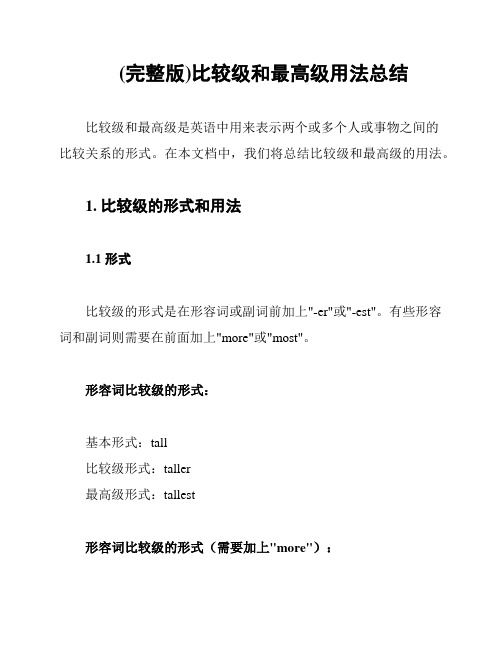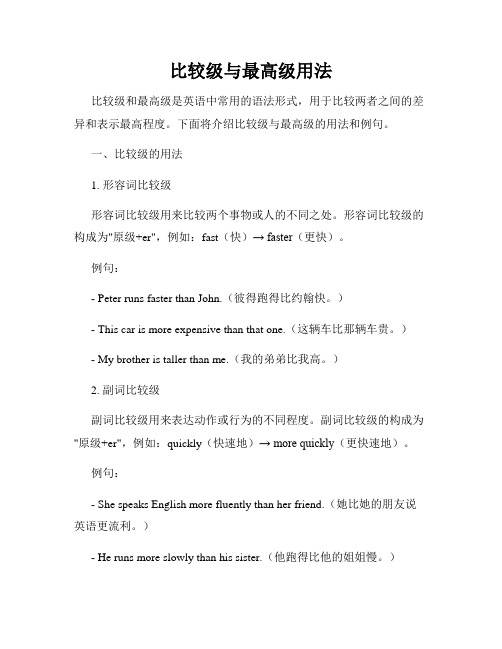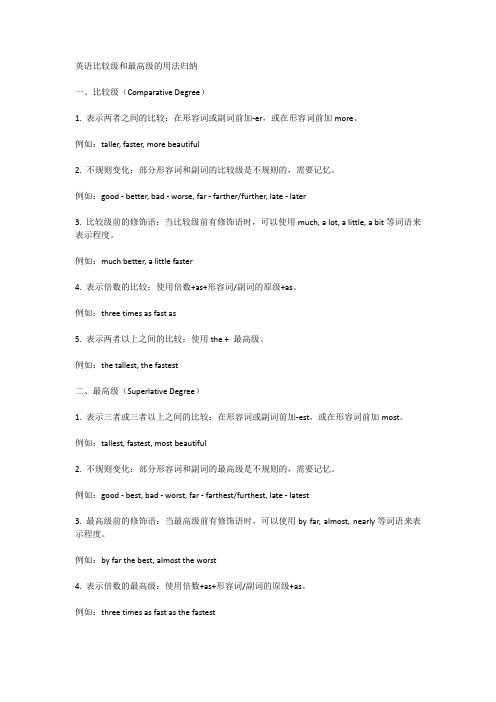(完整word版)六年级比较级与最高级的用法
比较级和最高级(可编辑修改word版)

一、形容词的比较级和最高级变化规则;1、规则变化:(1)单音节词和少数双音节词一般在词尾加 er 或 est:如: small ---smaller --- the smallest(2)以不发音的 e 字母结尾的加 r,或 st:如: late --- later --- the latest(3)以辅音字母加 y 结尾的变 y 为 I 加 er 或 est:如: easy --- easier --- the easiest(4)以一个辅音字母结尾的重读闭音节词双写最后一个辅音字母再加 er 或 est:如 : big --- bigger --- the biggest以 er,ow 结尾的双音节词加 er 或 est如: slow --- slower --- the slowest(5)多音节词前加 more 或 most, 副词最高级前省略 the.如: important --- more important --- the most important2.不规则变化good / well --- better --- the best 好bad / badly / ill --- worse --- the worst 坏many / much --- more --- the most 多little --- less --- the least 少old --- older / elder --- the oldest / the oldest 老 , 旧far --- farther / further --- the farthest / the furthest 远常见形容词比较级、最高级变化一览表1.在形容词词尾加上“er”“est”构成比较级、最高级:bright (明亮的)—brighter—brightest broad(广阔的)—broader—broadest cheap(便宜的)—cheaper—cheapest clean(干净的)—cleaner—cleanestclever(聪明的)—cleverer—cleverest cold(寒冷的)—colder—coldestcool(凉的)—cooler—coolest dark(黑暗的)—darker—darkestdeep(深的)—deeper—deepest fast(迅速的)—faster—fastestfew(少的)—fewer—fewest great(伟大的)—greater—greatesthard(困难的,硬的)—harder—hardest high(高的)—higher—highestkind(善良的)—kinder—kindest light(轻的)—lighter—lightestlong(长的)—longer—longest loud(响亮的)—louder—loudest low(低的)—lower—lowest near(近的)—nearer—nearest new(新的)—newer—newest poor(穷的)—poorer—poorest quick(快的)—quicker—quickest quiet(安静的)—quieter—quietest rich(富裕的)—richer—richest short(短的)—shorter—shortest slow(慢的)—slower —slowest small(小的)—smaller—smallestsmart(聪明的)—smarter—smartest soft(柔软的)—softer—softeststrong(强壮的)—stronger—strongest sweet(甜的)—sweeter—sweetesttall(高的)-taller-tallest thick(厚的)—thicker—thickest warm(温暖的)—warmer—warmest weak(弱的)—weaker—weakest young(年轻的)—younger—youngest2.双写最后一个字母,再加上“er”“est”构成比较级、最高级:big(大的)—bigger—biggest fat(胖的)—fatter—fattest hot(热的)—hotter—hottest red(红的)—redder—reddestsad(伤心的)—sadder—saddest thin(瘦的)—thinner—thinnestwet(湿的)—wetter—wettest mad(疯的)—madder—maddest3.以不发音的字母e 结尾的形容词,加上“r”“st”构成比较级、最高级:able(能干的)—abler—ablest brave(勇敢的)—braver—bravest close(接近的)—closer—closest fine(好的,完美的)—finer—finest large(巨大的)—larger—largest late(迟的)—later—latest nice(好的)—nicer—nicest ripe(成熟的)—riper—ripest rude (粗鲁的)—ruder—rudest safe(安全的)—safer—safest strange(奇怪的)—stranger—strangest wide(宽广的)—wider—widest wise(睿智的,聪明的)—wiser—wisest white(白的)—whiter—whitest4.以字母y 结尾的形容词,把y 改为i,再加上“er”“est”构成比较级、最高级:busy(忙碌的)—busier—busiest dirty(脏的)—dirtier—dirtiest dry (干燥的)—drier—driest early(早的)—earlier—earliest easy(容易的)—easier—easiest friendly(友好的)—friendlier—friendliest funny(好玩的)—funnier—funniest happy(开心的)—happier—happiest healthy(健康的)—healthier—healthiest heavy(重的)—heavier—heaviesthungry(饿的)—hungrier—hungriest lazy(懒惰的)—lazier—laziest lucky(幸运的)—luckier—luckiest naughty(调皮的)—naughtier—naughtiest noisy(嘈杂的)—noisier—noisiest pretty(美丽的)—prettier—prettiest silly(傻的)—sillier—silliest spicy(辣的)—spicier—spiciest thirsty (渴的)—thirstier—thirstiest ugly(丑的)—uglier—ugliest4.双音节、多音节形容词,在单词前面加上“more”“most”构成比较级、最高级:afraid(害怕的)—more afraid—most afraid beautiful(美丽的)—more beautiful—most beautiful careful(仔细的)—more careful—most careful cheerful(开心的)—more cheerful—most cheerful crowded(拥挤的)—morecrowded—most crowded dangerous(危险的)—moredangerous—most dangerous delicious(美味的)—moredelicious—most delicious difficult(困难的)—more difficult—most difficult exciting(令人兴奋的)—more exciting—most exciting expensive(昂贵的)—more expensive—mostexpensive famous(著名的)—more famous—most famousfrightened(受惊的)—more frightened—most frightenedfrightening(令人害怕的)—more frightening—most frighteninghard-working(勤奋的)—more hard-working—most hard-workinghelpful(有帮助的)—more helpful—most helpful honest(诚实的)—more honest—most honest important(重要的)—more important—most important interesting(有趣的)—more interesting—most interesting polite(有礼貌的)—more polite—most polite terrible(可怕的)—moreterrible—most terrible tired(累的)—more tired—most tired5.不规则变化的形容词:bad(坏的)—worse—worst good(好的)—better—bestfar(远的)—farther—farthest (far—further—furthest) ill(病的)—worse—worst little(少的)—less—leastmany(多的)—more—most much(多的)—more—mostold(年老的)—older—oldest ( old—elder—eldest) well(好的,身体好的)—better—best一. 写出下列形容词或副词的比较级和最高级.badcleanfamousdirtybigsmallheavylittlehardhappyfarexpensivewelleasywideyoungrudecheapuglybusyoldnoisyinterestinghotcold many brightboring difficultbeautifulthingoodstronghighwarmlateweaktallshortloudlazyquickangrycleversmartlow二、选择填空1.Which does Jimmy like , Chinese or Art?A.wellB. bestC. betterD. much2.The Changjiang River is one of in the world.A. the longest riverB. longest riversC. the longest riversD. longer rivers3.of the two women is Mrs Brown.A.The beautifulB. The more beautifulC. More beautifulD. The most beautiful4.My mooncake is nicer his.A.likeB. withC. forD. than5.You are fatter than .A.heB. hisC. himD. he is tall6.He jumps of the three.A.farB. furtherC. farthestD. furthest7.My hair is longer than .A.my sisterB. KateC. my brother’sD. Lucys’8.There are paper here .Please bring some.A.littleB. lessC. fewerD. a little9.The pen is than that one.A.more cheapB. cheapC. much cheaperD. quite cheaper10.Tom speaks Chinese better than Jimmy.A. moreB. veryC. a lot ofD. much11.There are girls in Class Two than in Class Four.A. moreB. nicestC. mostD. best12.It’s too for you to do that.A. easyB. more dangerousC. harderD. the easiest13.Who has apples now, Jim, Lily or Lucy?A. muchB. biggestC. betterD. the most14.You have more rulers than me. But are nicer than .A.mine, yoursB. mine, yourC. my, yoursD. my, your15.Tingting is than Meimei, but Meimei is than Tingting.A.all, strongerB. taller, strongestC. tallest, strongD. taller, stronger16.Mother is in my family.A. busyB. busierC. the busiestD. more busy17.There are in the park on Sunday.A. more childrenB. a lot of peopleC. much men and womenD. many peoples18.-This blue sweater is too big for me .-Will you please show me a one?A. smallB. smallerC. the smallestD. smallest19.No one is Mary in the class.A. so tallest asB. as taller asC. so high asD. so tall as20. This bike is than that one.A. twenty yuan dearB. twenty yuan dearerC. dear twenty yuanD. dearer twenty yuan[参考答案]CCDDA CDBCD AADAD CBBDB三、用所给词的适当形式填空1.Y our classroom is (wide) and (bright) than ours.2.T here are (few) hours of sunlight a day in winter than in summer.3.Which do you like (well) , maths or chemistry?4.This is the (good) film I have ever seen.5.Africa is the second (large) continent.6.What he said made his mother much (angry) .7.I’m not as (careful) as he.8.We’ve got as (many) books as we need.9.Pratice as (much) as you can.10.They have done (much) work with (little) money.11.You’re the (kind) person I’ve ever met.12.He is (young) than his two sisters.13.The (old) I get, the (strong) I seem to feel.14.The weather is getting (warm) and (warm) .15.Summer is (hot) season of the year.[参考答案] 1. wider, brighter 2. fewer 3. better 4. best 5. largest 6. angry 7. careful 8. many 9. much 10. more, less 11. kindest 12. younger 13. older, stronger, 14. warmer, warmer 15. the hottest。
(完整word版)比较级和最高级

Grammar1. 形容词/副词的比较等级(1)—用法讲解大多数的形容词都有三个级别:原级、比较级、最高级。
其中比较级表示“更……”,用于两者之间的比较,用来说明“前者比后者更……”,比较级前面一般用much, even, a little修饰,其中even, much 只能修饰比较级。
最高级表示“最……”,用于三者及三者以上之间的比较,用来说明“某人或某物在某个范围内最……”①形容词的比较级(-er)和最高级(-est)的构成a. 规则变化之口诀:直接加;去e加;双写加;变y加; more/ mostb. 不规则变化原级比较级最高级good / well better best bad / ill worse worst many / much more most little less least far farther, further farther, further old older, elder oldest, eldest②比较级前的修饰语still, even, any, quite(a bit), almost, nearly, just, rather;a little, a bit;much, a lot, far, many;twice, ten times, one fourth, two pounds, three years(2)—常见句型①A=B A+ be + as + adj./adv. + as + B (与。
一样)He is as tall as I/me. 他和我一样高。
He is as good a teacher as his father.他和他的父亲一样是个好教师。
②A≠ B A + be+ not + as/so + adj./adv. + as + B (与。
不一样)They didn’t do as/so much work as you did. 他们干得事没有你多。
比较级最高级变化规则总结

比较级最高级变化规则总结在英语学习中,比较级和最高级是非常重要的语法知识点。
它们用于描述事物之间的程度差异,帮助我们更准确、生动地表达想法。
下面就来详细总结一下比较级和最高级的变化规则。
一、形容词和副词比较级和最高级的构成规则1、一般情况单音节词和少数双音节词,直接在词尾加 er 构成比较级,加 est 构成最高级。
例如:tall(高的) taller tallest例如:short(矮的) shorter shortest例如:fast(快的) faster fastest以不发音的 e 结尾的单音节词,直接在词尾加 r 构成比较级,加 st 构成最高级。
例如:nice(好的) nicer nicest例如:large(大的) larger largest以重读闭音节结尾,且末尾只有一个辅音字母的词,要先双写这个辅音字母,再加 er 构成比较级,加 est 构成最高级。
例如:big(大的) bigger biggest例如:hot(热的) hotter hottest例如:thin(瘦的) thinner thinnest2、多音节词和部分双音节词在词前加 more 构成比较级,加 most 构成最高级。
例如:beautiful(美丽的) more beautiful most beautiful例如:important(重要的) more important most important例如:difficult(困难的) more difficult most difficult3、不规则变化有些形容词和副词的比较级和最高级变化是不规则的,需要特别记忆。
例如:good(好的) better best例如:bad(坏的) worse worst例如:many / much(许多) more most例如:little(少的) less least例如:far(远的) farther / further farthest / furthest二、比较级和最高级的用法1、比较级的用法表示两者之间的比较,常用“than”连接。
(完整word版)比较级最高级变化规则总结(word文档良心出品)

popular
more popular
most popular
最受欢迎的
3.
talkative
more talkative
most talkative
最健谈的
4.
hardworking
more hardworking
most hardworking
最勤奋地
5.
honest
more honest
most honest
heavier
heaviest
最重的
9.
friendly
friendlier
friendliest
最友好的
10.
shy
shier
shiest
最害羞的
11.
lucky
luckier
luckiest
最幸运的
12.
dry
drier
driest
最干的
13.
healthy
healthier
healthiest
thickest
最厚的
12.
cheap
cheaper
cheapest
最便宜的
13.
slow
slower
slowest
最慢的
14.
strong
stronger
strongest
最强壮的
15.
weak
weaker
weakest
最弱的
16.
new
newer
newest
最新的
17.
warm
warmer
warmest
busy
busier
比较级和最高级归纳总结

b) 不规则变化: good — better — best well — better — best bad — worse — worst many/much — more — most
far — farther —farthest far — further — furthest old — elder — eldest old — older — oldest
4. 使用形容词比较级时需注意以下几点:
1) than后面接代词时, 一般要用主格形式,
但在口语中也可使用宾格形式。 如:
My brother is taller than I / me.
2) 当需要表示一方超过另一方的程度时, 可以用much, a lot, a little, a bit, even, still 等来修饰形容词比较级。注意: 比较级不 能用very, so, too, quite等修饰。如: He is much more serious than Sam.
个时, 用最高级。最高级的前面一般要加定
冠词 the, 后面可带 of ( in )短语来说明比较
的范围。
如:She is the youngest in the class.
Jason is the tallest of the three.
Whose handwriting is the best of all?
2. 最高级可被序数词以及 much,by far, nearly,almost,by no means,not quite, not really,nothing like 等词语所修饰。例 如: This hat is by far/much/nearly/almost /not nearly/by no means/not quite/ nothing like the biggest. How much did the second most expensive hat coat?
(完整版)比较级和最高级用法总结

(完整版)比较级和最高级用法总结比较级和最高级是英语中用来表示两个或多个人或事物之间的比较关系的形式。
在本文档中,我们将总结比较级和最高级的用法。
1. 比较级的形式和用法1.1 形式比较级的形式是在形容词或副词前加上"-er"或"-est"。
有些形容词和副词则需要在前面加上"more"或"most"。
形容词比较级的形式:基本形式:tall比较级形式:taller最高级形式:tallest形容词比较级的形式(需要加上"more"):基本形式:beautiful比较级形式:more beautiful最高级形式:most beautiful副词比较级的形式:基本形式:quickly比较级形式:more quickly 或 faster最高级形式:most quickly 或 fastest1.2 用法比较级常用于以下几种情况:- 比较两个人或物体的相对性质或程度。
例如:- He is taller than his brother.- This book is more interesting than that one.- 比较两个人或物体进行选择或决策。
例如:- I prefer coffee to tea.- She is more suitable for the job.- 表示一个人或物体在某一方面比另一个人或物体更具特征。
例如:- The second movie was scarier than the first one.- He is more intelligent than his classmates.2. 最高级的形式和用法2.1 形式最高级的形式是在形容词或副词前加上定冠词"the",并在其后加上"-est"。
有些形容词和副词则需要在前面加上"most"。
比较级与最高级用法

比较级与最高级用法比较级和最高级是英语中常用的语法形式,用于比较两者之间的差异和表示最高程度。
下面将介绍比较级与最高级的用法和例句。
一、比较级的用法1. 形容词比较级形容词比较级用来比较两个事物或人的不同之处。
形容词比较级的构成为"原级+er",例如:fast(快)→ faster(更快)。
例句:- Peter runs faster than John.(彼得跑得比约翰快。
)- This car is more expensive than that one.(这辆车比那辆车贵。
)- My brother is taller than me.(我的弟弟比我高。
)2. 副词比较级副词比较级用来表达动作或行为的不同程度。
副词比较级的构成为"原级+er",例如:quickly(快速地)→ more quickly(更快速地)。
例句:- She speaks English more fluently than her friend.(她比她的朋友说英语更流利。
)- He runs more slowly than his sister.(他跑得比他的姐姐慢。
)- They arrived earlier than expected.(他们比预计的时间早到。
)3. 不规则比较级有一些形容词和副词的比较级形式是不规则的,需要单独记忆。
例如:good(好)→ better(更好),bad(坏)→ worse(更糟)。
例句:- The weather today is better than yesterday.(今天的天气比昨天好。
)- Her performance in the exam was worse than expected.(她在考试中的表现比预期的要糟糕。
)二、最高级的用法1. 形容词最高级形容词最高级用来表达三个或三个以上事物或人之间的最高程度。
英语比较级和最高级的用法归纳

英语比较级和最高级的用法归纳一、比较级(Comparative Degree)1. 表示两者之间的比较:在形容词或副词前加-er,或在形容词前加more。
例如:taller, faster, more beautiful2. 不规则变化:部分形容词和副词的比较级是不规则的,需要记忆。
例如:good - better, bad - worse, far - farther/further, late - later3. 比较级前的修饰语:当比较级前有修饰语时,可以使用much, a lot, a little, a bit等词语来表示程度。
例如:much better, a little faster4. 表示倍数的比较:使用倍数+as+形容词/副词的原级+as。
例如:three times as fast as5. 表示两者以上之间的比较:使用the + 最高级。
例如:the tallest, the fastest二、最高级(Superlative Degree)1. 表示三者或三者以上之间的比较:在形容词或副词前加-est,或在形容词前加most。
例如:tallest, fastest, most beautiful2. 不规则变化:部分形容词和副词的最高级是不规则的,需要记忆。
例如:good - best, bad - worst, far - farthest/furthest, late - latest3. 最高级前的修饰语:当最高级前有修饰语时,可以使用by far, almost, nearly等词语来表示程度。
例如:by far the best, almost the worst4. 表示倍数的最高级:使用倍数+as+形容词/副词的原级+as。
例如:three times as fast as the fastest5. 表示所有事物中的最高程度:使用on earth, in the world等词语。
- 1、下载文档前请自行甄别文档内容的完整性,平台不提供额外的编辑、内容补充、找答案等附加服务。
- 2、"仅部分预览"的文档,不可在线预览部分如存在完整性等问题,可反馈申请退款(可完整预览的文档不适用该条件!)。
- 3、如文档侵犯您的权益,请联系客服反馈,我们会尽快为您处理(人工客服工作时间:9:00-18:30)。
课前准备:检查学生掌握单词情况(听写)一、形容词、副词的比较级和最高级的构成规则1.一般单音节词和少数以-er,-ow结尾的双音节词,比较级在后面加-er,最高级在后面加-est;(1)单音节词如:small→smaller→smallest short→shorter→shortesttall→taller→tallest great→greater→greatest(2)双音节词如:clever→cleverer→cleverest narrow→narrower→narrowest2.以不发音e结尾的单音节词,比较在原级后加-r,最高级在原级后加-st;如:large→larger→largest nice→nicer→nicest able→abler→ablest 3.在重读闭音节(即:辅音+元音+辅音)中,先双写末尾的辅音字母,比较级加-er,最高级加-est;如:big→bigger→biggest hot→hotter→hottest fat→fatter→fattest 4.以“辅音字母+y”结尾的双音节词,把y改为i,比较级加-er,最高级加-est;如:easy→easier→easiest heavy→heavier→heaviestbusy→busier→busiest happy→happier→happiest5.其他双音节词和多音节词,比较级在前面加more,最高级在前面加most;如:beautiful→more beautiful→most beautifuldifferent→more different→most differenteasily→more easily→mo st easily注意:(1)形容词最高级前通常必须用定冠词 the,副词最高级前可不用。
例句: The Sahara is the biggest desert in the world.(2)形容词most前面没有the,不表示最高级的含义,只表示"非常"。
It is a most important problem.=It is a very important problem.6.有少数形容词、副词的比较级和最高级是不规则的,必须熟记。
如:good→better→best well→better→bestbad→worse→worst ill→worse→worstold→older/elder→oldest/eldestmany/much→more→most little→less→leastfar →further/farther→ furthest/farthest词形变换。
比较级最高级large _________________ ___________________fast _________________ ___________________easy _________________ ___________________wet _________________ ___________________good _________________ ___________________important _________________ ___________________well __________________ ___________________bad _________________ ___________________many _________________ ___________________little _________________ ___________________far _________________ ___________________strong _________________ ___________________patient _________________ ___________________safe _________________ ___________________expensive _________________ ___________________二、形容词、副词的比较级和最高级的句子公式:比较级形容词物体A + am / are / is + 形比 + than + 物体B.I am taller than you.Pasta is more delicious than pizza.副词物体A + 行为动词 + 副比 + than + 物体B.Cheetahs run faster than goats.He studies better than me.最高级1)物体A + am / are / is + the + 形最高级 + 比较范围(of + 人/物,in +地方).I am the tallest in the class.Pasta is the most delicious food of the three.2)物体A + 行为动词 + 副词最高级 + 比较范围(of + 人/物,in + 地方). Cheetahs run fastest in the world.He studies best of us.1. She is ________ than ________ .A. busier / usB. busier / weC. more busy / usD. more busy / we2. Jane is ________ than Betty.A. less tallerB. less tallestC. less tallD. not as tall3. China is ________ country in the world.A. the third largestB. the largest thirdC. the third largeD. a third largest4. -Which is ____ season in Beijing?-I think it's autumn.A.goodB.betterC.bestD.the best5.- Which is__________ , the sun, the moon or the earth?-- Of course, the moon is.A.smallB.smallerC.smallestD.the smallest6.The air in Beijing is getting much _____ now than a few years ago.A. cleanB. cleanerC. cleanestD. the cleanest7. Mobile phones are very popular now and they are _____ than before.A. cheapB. cheaperC. cheapestD. the cheapest8.I study English as_______as my brother.A.hardB. harderC. hardest9. Which is _____ , a bicycle or a computer?A. expensiveB.more expensiveC.the most expensive10. The Yellow River is one of ______rivers in China.A longB longerC the longest11.She is the second _______student in our class.A. tallB. tallerC. tallest用括号里的词的适当形式填空。
1. Tom can jump _______(high). He jumps _______(high) than the other boys inhis class.2. Janet sing _______(well) in her class. She can sing ______(well) than her music teacher, too.3. My father is ______(handsome). But my brother is ________(handsome) than him. He is ______(handsome) in my family.4. I have ______(many) books in my class. But my teacher has _____(many) booksthan ____(I).5.______(they) house is much ______(old) than ______(we).三、形容词和副词比较级的用法1.“A + be +形容词比较级+ than + B” 意思为“A比B更……”。
如:This tree is taller than that one. 这棵树比那棵树高。
注意:① 在含有连词than的比较级中,前后的比较对象必须是同一范畴,即同类事物之间的比较。
②在比较级前面使用much,表示程度程度“强得多”。
如:A watermelon is much bigger than an apple.③ very, quite一般只能修饰原级,不能修饰比较级。
2.“比较级 + and + 比较级”或“more and more +原级”表示“越来越……”如:It becomes warmer and warmer when spring comes.春天来了,天气变得越来越暖和了。
It is getting cooler and cooler.天气越来越凉爽。
The wind became more and more heavily.风变得越来越大。
Our school is becoming more and more beautiful.我们的学校变得越来越美丽。
3.在含有or的选择疑问句中,如果有两者供选择,前面的形容词要用比较级形式。
如:Who is taller,Tim or Tom? 谁更高,Tim还是Tom?4. “the +比较级……, the+比较级”,表示“越……越……”。
The more money you make, the more you spend.钱你赚得越多,花得越多。
